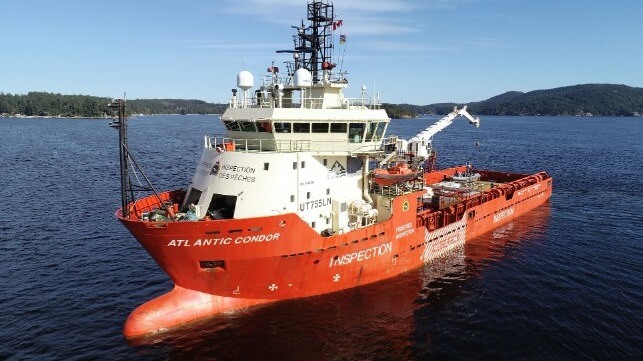Canada Charters a PSV to Carry Out a Long-Range Fishery Patrol

Later this year, a multinational patrol mission led by Canada will set out to counteract illegal, unregulated and unreported (IUU) fishing in the North Pacific. It will be the nation's first experience leading a patrol of this kind.
Instead of a government vessel, Fisheries and Oceans Canada (DFO) has chartered a commercial vessel from private shipowner Atlantic Towing to serve as a platform. A photo released by the agency suggests that the vessel is the Atlantic Condor, a 2010-built PSV/IMR vessel. Embarked U.S. Coast Guard officers will serve as the boarding teams.
The four-month voyage is underwritten by Canadian federal funding for salmon preservation, reflecting the importance of the North Pacific for sustaining British Columbia's salmon population. The mission will concentrate on conservation, protection and enforcement efforts in high-risk areas for Canada’s Pacific salmon stocks.
The mission will comb an area of about 28 million square kilometers, and will include high seas boardings and inspection operations to ensure compliance. It is one element of Canada's contribution to Operation North Pacific Guard, a long-running U.S. Coast Guard-led effort to crack down on IUU fishing and illegal driftnet use on the high seas.
The officers will also collect scientific data to enhance understanding of the environment, including the migration range of Pacific salmon.
Canada is raising the red flag that increasing IUU fishing activities are posing a significant risk to salmon populations in the North Pacific Ocean, which have declined drastically in recent years. Scientists project that going by the current rate, salmon survival will drop by as much as 90 percent over the next 40 years, with warming ocean temperatures also being a major factor.
Commercial salmon catches throughout the North Pacific dropped in 2022 to the second lowest harvest of this century after reaching all-time highs in 2018.
Though there are over 1,200 vessels registered to fish in the high seas beyond 200 nautical miles’ jurisdiction of the North Pacific under the North Pacific Fisheries Commission, an area that covers from the west coast of Canada to the east coast of Japan, the vast waters have in witnessed a significant increase in IUU activities, a majority of which are conducted by “dark” fishing fleets with Chinese connections.
IUU fishing has been estimated to account for roughly 30 percent of all fishing activity globally, amounting to as much as 26 million metric tonnes of fish annually.
“Pacific salmon is vital to the food security, cultures and economies of numerous First Nations, as well as the livelihoods of thousands of workers in rural and coastal communities in British Columbia and Yukon. As fish are not bound by borders, we must take decisive action to safeguard these species. This high seas enforcement operation will assist in the rebuilding efforts we are undertaking domestically,” said Joyce Murray, Minister of Fisheries, Oceans and the Canadian Coast Guard.
